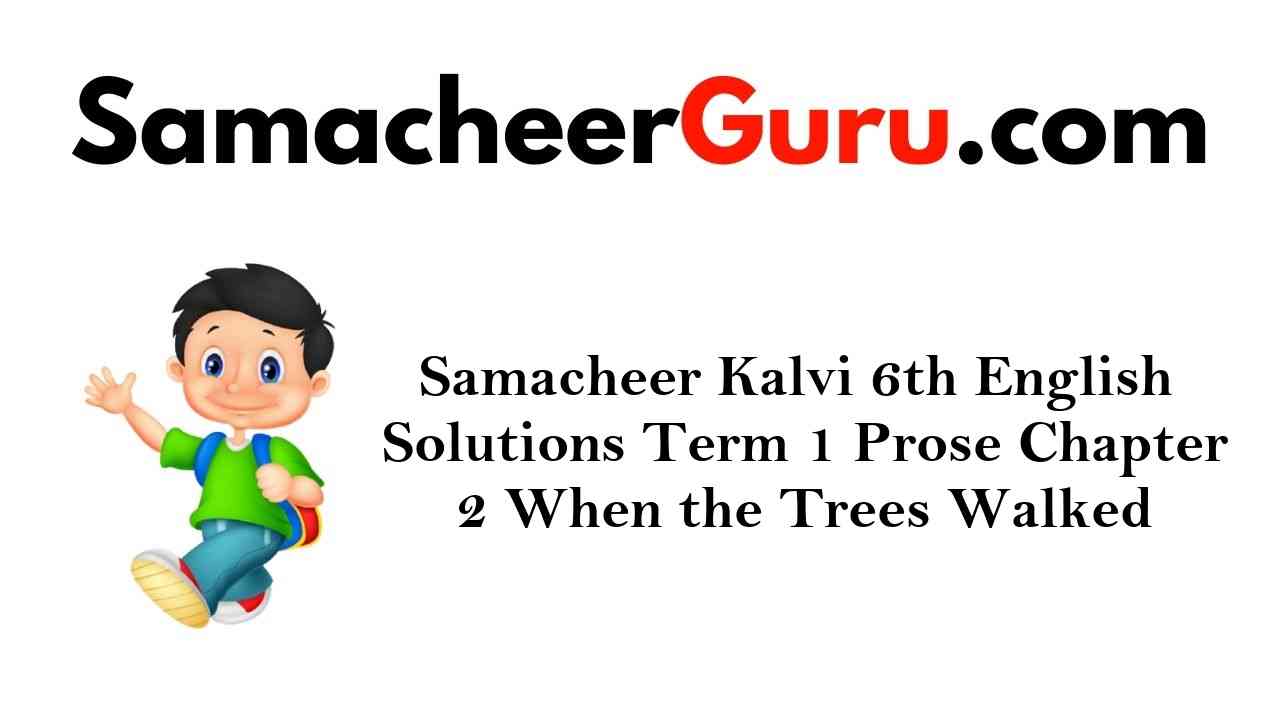Students can Download English Lesson 2 When the Trees Walked Questions and Answers, Summary, Activity, Notes, Samacheer Kalvi 6th English Book Solutions Guide Pdf helps you to revise the complete Tamilnadu State Board New Syllabus and score more marks in your examinations.
Tamilnadu Samacheer Kalvi 6th English Solutions Term 1 Prose Chapter 2 When the Trees Walked
Reading
Listen to your teacher read the first part of the story. Many things described in the story can be seen in the picture. Find and name them.
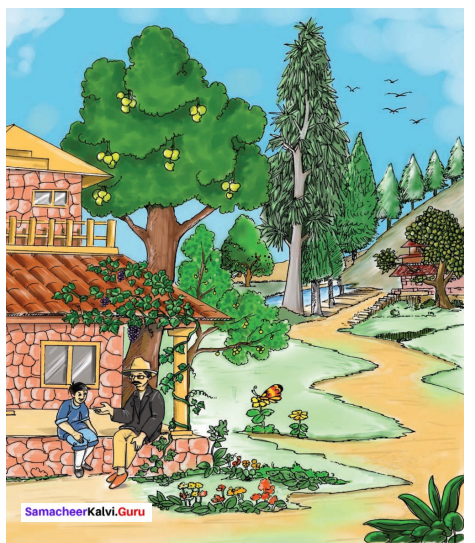
Answer:
- Mango Tree
- Bungalow
- Author
- Grandpa
- Plants
- Butterflies
Discuss and answer.
When The Trees Walked Questions And Answers Question 1.
When did the garden become a happy place for the author?
Answer:
The garden became a happy place for the author when his grandfather joined him.
When The Trees Walked Question 2.
What are the two reasons the author gives for the plants moving towards grandfather?
Answer:
The two reasons the author gives for the plants moving towards grandfather are:
- Light & Warmth
- They liked to be near grandpa.
When The Trees Walked 6th Standard Question 3.
Why does the writer think that the peepul tree is a great show off?
Answer:
Even when there is no breeze, their road-chested, slim-waisted leave will spin like tops determined to attract your attention and invite you into the shade.
Discuss and answer.
When The Trees Walked Book Back Answers Question 1.
Why do we need trees? List four reasons that Grandfather gives.
Answer:
- We need trees to keep the desert away.
- To attract rain.
- To prevent banks of rivers being washed away.
- For fruits and flowers
- For timber.
When The Trees Walked Lesson Question Answer Question 2.
Why did the author help his Grandfather plant trees?
Answer:
The thought of a world without trees became a sort of nightmare to the author and so he helped his Grandfather in his tree-planting with greater enthusiasm.
6th English When The Trees Walked Question 3.
What made Grandfather plant saplings on the rocky island?
Answer:
There was a mango tree on the island. So grandfather planted saplings there.
Discuss and answer.
When The Trees Walked Question 1.
What did grandmother feel about trees growing in the house?
Answer:
Grandmother felt that trees growing in the house made it look like a roof brought down by jungle.
When The Trees Walked Lesson Question 2.
Why did the author leave town?
Answer:
The author left town to live with his father.
When The Trees Walked 6th Standard Question 3.
How did grandfather’s dream come true?
Answer:
The island became a small green paradise.
When The Trees Walked Questions Question 4.
Describe what the author saw when he went back to the Island.
Answer:
When he went back to the island, the author noticed smaller trees, wild plants and grasses had sprung up under their protection. The trees they had planted long ago had multiplied.
Read and Understand
A. Tick the most appropriate option.
6th Standard When The Trees Walked Question 1.
According to the author the tendril was moving towards grandfather because it
(a) needed light and warmth .
(b) did not like the light and warmth,
(c) wanted to be near Grandfather. (✓)
(d) wanted to escape from the winter
2. Grandmother had wanted the peepul tree cut down because
(a) she did not like trees.
(b) she wanted to grow flowers.
(c) it was an old tree.
(d) it was knocking down the bricks of the outhouse. (✓)
3. Grandfather helped grandma out with the gardening because he
(a) liked gardening.
(b) wanted to grow flowers to attract butterflies. (✓)
(c) wanted to beautify the garden.
(d) wanted to make the house green.
4. The author did not want to plant saplings in the forest because
(a) no one would come to see them (✓)
(b) it was dangerous to enter the forest.
(c) it would not be of any use to them.
(d) no one would appreciate them.
5. Grandfather felt planting trees would help the forest because
(a) he wanted to make the view beautiful.
(b) the river-bed was dry.
(c) animals and birds in the forest would love him.
(d) the animals and birds would find it easier to live. (✓)
6. When the author returned from England to Dehradun, he found Grandfather’s dream had come true because the
(a) old house had changed.
(b) river was full.
(c) trees had red flowers.
(d) forest covered the island. (✓)
B. Read the story on your own. Discuss in a group and complete the story map below.
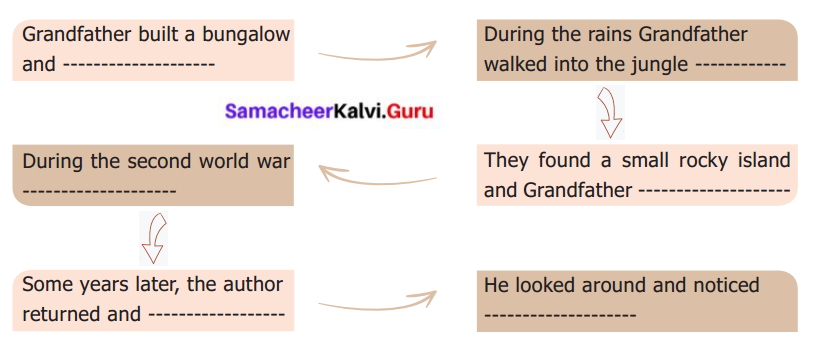
Answer:
story map is the main events of the story given in a flow chart.
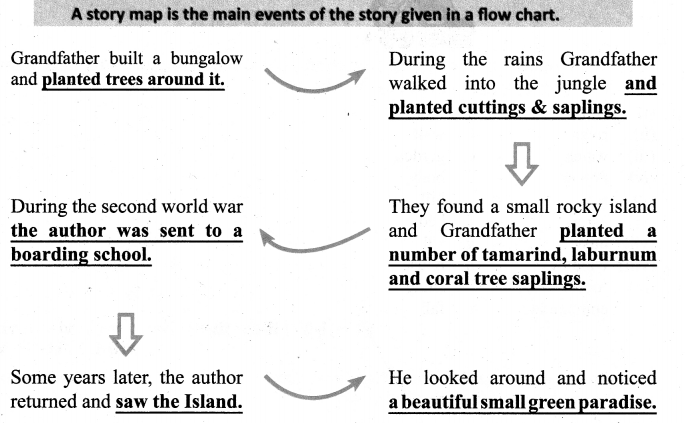
C. Work in groups of five. Tell the story in ten sentences.
You can begin the story like this :
The author’s Grandfather served in the Indian Forest Service.
After his retirement he built ________
Now continue the story. Each one should say one sentence.
Answer:
- Grandfather built a bungalow.
- He planted trees around it.
- During the rains Grandfather walked into the jungle.
- He planted cuttings & saplings.
- They found a small rocky island.
- Grandfather planted a number of tamarind, laburnum and coral tree saplings.
- During the second world war, the author was sent to a boarding school.
- Two or three years later he went to England.
- Some years later, the author returned and saw the island.
- He looked around and noticed a beautiful small green paradise.
D. Write a summary based on the story map.
Answer:
Grandfather built a bungalow and planted trees around it. During the rains grandfather walked into the jungle. He planted cuttings & saplings. They found a small rocky island and grandfather planted a number of tamarind, laburnum and coral tree saplings. During the second world war, the author was sent to a boarding school. Two or three years later he went to England. Some years later, the author returned and saw the island. He looked around and noticed a beautiful small green paradise.
Vocabulary
E. Look at the words in the boxes. Match the words to make as many new words as possible. One is done for you. Eg. out house.
- Out – a. root
- river – b. wall
- water – c. garden
- flower – d. body
- sun – e. hill
- aerial – f. bed
- busy – g- sill
- window – h. house
- foot – i. shine
- compound – j fall
Answer:
- (h)
- (f)
- (j)
- (c)
- (i)
- (a)
- (d)
- (g)
- (e)
- (b)
F. Look at the words in the box. Make new words by adding ‘ly’ wherever possible, it will not be possible until all the words.
lone
blossom
fertile
vigorous
place
constant complete
strong
unlike
great
cross
immediate
broad
Answers:
lonely
vigorously
constantly
completely
strongly
unlikely
greatly
immediately
broadly
G. Look at the words in the box. Fill the wheel with their antonyms.
All the words begin with ‘S’ and are from the text.
hard, fat, weak, big, fast, hide, rough, dull
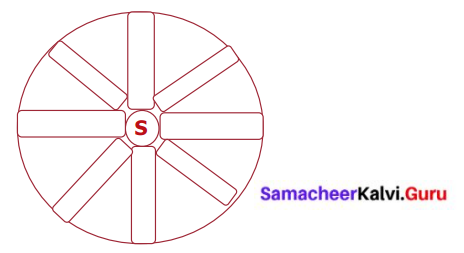
Answer:
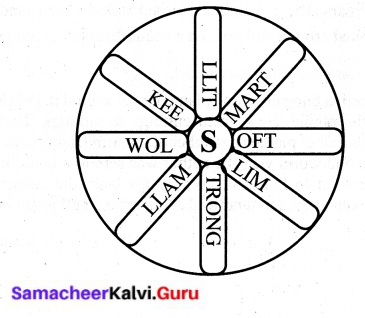
hard × soft
fat × slim
weak × strong
big × small
fast × slow
hide × seek
rough × soft/still
dull × smart
Listening
H. Listen to you r teacher read out what happened to Nandhu. Some of the statements given beiow are correct. Tick them (✓).
- The truck went over a stone. (x)
- The box fell out of a truck. (✓)
- The brass lamp was in the truck. (x)
- Nandhu wanted to play with the lamp. (✓)
- It was like the lamp Nandhu had at home. (x)
- Nandhu pressed a button. (✓)
Speaking
I. Take something from your school bag. Describe it in three sentences. Ask the class to find out the thing you have described.
- I have a thin wooden piece.
- It has graphite in it.
J. Discuss in groups of five. Make a story about the comic strip. Then share it in the doss.
(To be done by the students)
Use Grammar
K. Tick the right option to fill in the blanks.
When The Trees Walked Question 1.
a beautiful flower!
(a) How
(b) Wow
(c) What
(d) Hurrah
Answer:
(c) What
Question 2.
play football?
(a) You can
(b) Can you
(c) Have you
(d) You could
Amswer:
(b) Can you
Question 3.
did you go yesterday?
(a) Which
(b) Where
(c) What
(d) Who
Answer:
(b) Where
Question 4.
us go for a walk.
(a) Shall
(b) May
(c) Let
(d) Can
Answer:
(c) Let
Question 5.
like to play hide and seek.
(a) He
(b) She
(c) I
(d) Muthu
Answer:
(c) I
L. Look at the punctuation of these sentences. Why are they punctuated differently ? Discuss in class.
Question 1.
One always felt like drawing close to Him.
Answer:.
This sentence is a statement. So, we end it with a full stop.
Question 2.
But no one ever comes here
Answer:
This sentence expresses surprise. So, we end it with an exclamation mark.
Question 3.
Who’s going to see them?
Answer:
This sentence asks a question. So, we end it with aquestion mark.
Question 4.
Come here.
Answer:
This sentence gives a command. So, we end it with a full stop.
M. Work in pairs and say the sentences to each other. Do you hear any difference in the way it is spoken? Discuss and share with the class. Discuss the difference in the meaning of the sentences.
Question 1.
This is a banyan tree.
Answer:
Statement / Declarative Sentence.
Question 2.
Is this a banyan tree?
Answer:
Question / Interrogative Sentence.
Question 3.
What a beautiful banyan tree
Answer:
Exclamation / Exclamatory Sentence.
Question 4.
Look at this banyan tree.
Answer:
Command / Imperative Sentence.
N. Read these sentences from the story carefully. Do they give commands or requests or make statements? Write ‘C’ for command and ‘R’ for request and ‘S’ for statement,
- The tendril moved towards grandfather. [S]
- I want a roof over my head. [S]
- Please do not cut trees. [R]
- We spent the whole day planting saplings. [S]
- Will you please remove the trees growing on the [R]
- There was a forest on the island. [S]
- Go to the river bed. [C]
- The island was a green paradise. [S]
- Grow more trees to protect nature. [C]
- Grandfather’s dream had come true. [S]
writing
O. Look at the picture and write a paragraph using the dues in the picture.
Grow and protect trees
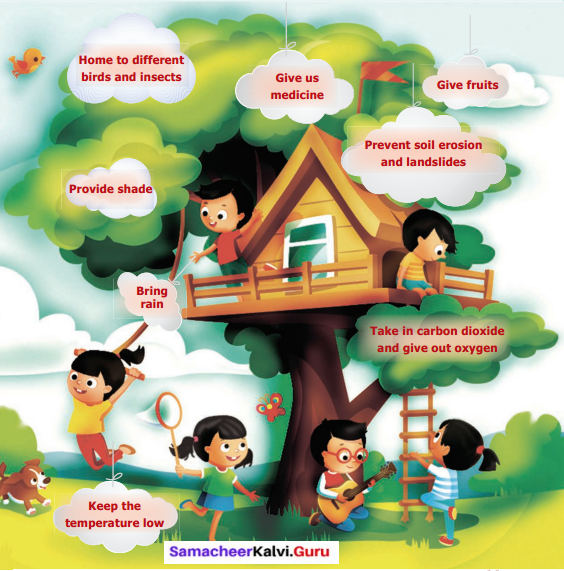
Answer:
Trees are most essential. They are the homes to different birds & insects. They give us medicine. They give fruits and provide shade. They prevent soil erosion & landslides. Trees bring rain and keep the temperature cool.
Creative Writing
Look at the Picture and write a story
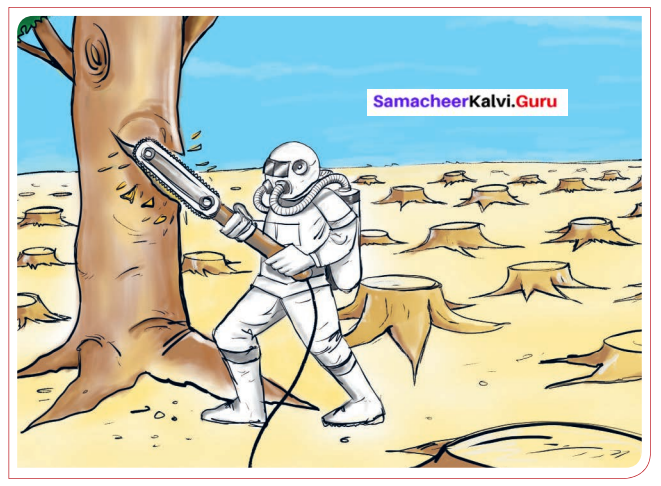
Answer:
Man needs oxygen to live. A man cuts trees for his needs but one day he realises that there is no good air to survive. The man needs oxygen cylinder. He pays the fees of cutting down trees.
When the Trees Walked Additional Questions
I. Select The Suitable Synonyms.
1. beside
(a) above
(b) next to
(c) below
Answer:
(b) next to
2. creeping
(a) crawling
(b) summing
(c) moving
Answer:
(a) crawling
3. beneath
(a) above
(b) under
(c) front
Answer:
(b) under
4. fertile
(a) barren
(b) worthy
(c) productive
Answer:
(c) productive
5. trailing
(a) making
(b) tracking
(c) stopping
Answer:
(b) tracking
6. abandoned
(a) deserted
(b) habited
(c) occupied
Answer:
(a) deserted
7. vigorous
(a) quick
(b) slow
(c) energetic
Answer:
(c) energetic
8. invite
(a) refuse
(b) welcome
(c) decline
Answer:
(b) welcome
9. determined
(a) confused
(b) set
(c) done
Answer:
(b) set
10. constantly
(a) rare
(b) never
(c) always
Answer:
(c) always
11. content
(a) plenty
(b) satisfied
(c) few
Answer:
(b) satisfied
12. protested
(a) opposed
(b) dispose
(c) destroy
Answer
(a) opposed
13. prevent
(a) stop
(b) allow
(c) send
Answer:
(a) stop
14. nightmare
(a) interesting dream
(b) terrific dream
(c) pleasant dream
Answer:
(b) terrific dream
15. enthusiasm
(a) fast
(b) dull
(c) excited
Answer:
(c) excited
16. spare
(a) pull
(b) leave
(c) change
Answer:
(b) leave
17. sheltered
(a) protected
(b) demolished
(c) cut
Answer:
(a) protected
18. interfering
(a) putting
(b) stopping
(c) letting
Answer:
(b) stopping
19. completely
(a) moderately
(b) partially
(c) totally
Answer:
(c) totally
20. rambling
(a) walking
(b) running
(c) wanderiftg
Answer:
(c) wandering
21. sprang
(a) rose
(b) jumped
(c) fall
Answer:
(a) rose
22. spectacular
(a) eye-catching
(b) wonderful
(c) unpleasant
Answer:
(a) eye-catching
23. beckon
(a) to chase
(b) to follow
(c) to call
Answer:
(c) to call
24. paradise
(a) hell
(b) forest
(c) heaven
Answer:
(c) heaven
25. contrast
(a) variation
(b) liken
(c) same
Answer:
(a) variation
II. Select The Suitable Antonyms.
1. slowly
(a) lazily
(b) fast
(c) moderately
Answer:
(b) fast
2. soft
(a) cozy
(b) smooth
(c) hard
Answer:
(c) hard
3. lonely
(a) accompanied
(b) isolated
(c) destitute
Answer:
(a) accompanied
4. broad
(a) large
(b) narrow
(c) extensive
Answer:
(b) narrow
5. including
(a) containing
(b) along with
(c) excluding
Answer:
(c) excluding
6. attract
(a) repel
(b) entice
(c) bring
Answer:
(a) repel
7. happy
(a) elated
(b) sad
(c) merry
Answer:
(b) sad
8. comer
(a) edge
(b) rim
(c) centre
Answer:
(c) centre
9. small
(a) big
(b) tiny
(c) paltry
Answer:
(a) big
10. prevent
(a) avoid
(b) let
(c) hinder.
Answer:
(b) let
11. beyond
(a) further
(b) farther
(c) nearby
Answer:
(c) nearby
12. protested
(a) accepted
(b) revolted
(c) objected
Answer:
(a) accepted
13. improve
(a) deteriorate
(b) mend
(c) develop
Answer:
(a) deteriorate
14. enthusiasm
(a) passion
(b) excitement
(c) disinterest
Answer:
(c) disinterest
15. many
(a) lot
(b) few
(c) any
Answer:
(b) few
16. dry
(a) arid
(b) wet
(c) barren
Answer:
(b) wet
17. crossly
(a) madly
(b) angrily
(c) calmly
Answer:
(c) calmly
18. bought
(a) sold
(b) acquired
(c) procured
Ans.
(a) sold
19. falling
(a) sliding
(b) raising
(c) dropping
Answer:.
(b) raising
20. several
(a) various
(b) lot of
(c) none
Answer:
(c) none
21. across
(a) forward
(b) beyond
(c) over
Answer:
(a) forward
22. whispered
(a) murmured
(b) roar
(c) muttered
Answer:
(b) roar
23. nearer
(a) closer
(b) beside
(c) furtherer
Answer:
(c) furtherer
24. multiplied
(a) divided
(b) augmented
(c) added
Answer:
(a) divided
III. State True or False.
- Grandfather had served many years in the Indian Forest Service
- During the holidays, I went to live with my father in Dehradun.
- My grandparents sold the house and went to Delhi.
- My grandfather taught me a poem by George Morris.
- In the fertile Doon Valley, plants and trees did not grow tall and strong.
Answers:
- True
- False
- False
- True
- False
IV. Choose the Correct Answer
Question 1.
_______ minutes later, it had crossed the step and was touching his
(a) Two
(b) Twenty
(c) Ten
(d) Five
Answer:
(b) Twenty
Question 2.
In the fertile Doon Valley, plants and trees grew tall and _______
(a) weak
(b) sturdy
(c) strong
(d) big
Answer:
(c) strong
Question 3.
Peepul. trees are great _______
(a) trees
(b) boons
(c) show offs
(d) gifts
Answer:
(c) show offs
Question 4.
But men are cutting down without
(a) growing
(b) replacing
(c) looking at
(d) plantini
Answer:
(b) replacing
Question 5.
Grandfather helped her out with the
(a) watering
(b) cutting
(c) planting
(d) gardening
Answer:
(d) gardening
Question 6.
We’re planting them for the _______
(a) garden
(b) prize
(c) forest
(d) award
Answer:
(c) forest
Question 7.
One day, the trees will _______ again
(a) run
(b) jump
(c) come
(d) move
Answer:
(d) move
Question 8.
We found a small _______ island
(a) stony
(b) pretty
(c) rocky
(d) award
Answer:
(c) rocky
Question 9.
At every turn, there was _______ new to see.
(d) always
(b) something
(c) rarely
Answer:
(b) something
Question 10.
When I went up to the trees, I noticed that some _______ were living in them.
(a) monkeys
(b) bats
(c) squirrels
(d) birds
Answer:
(c) squirrels
V. Very Short Answer Questions.
Question 1.
What did the author notice, white he was sitting beside his Grandfather?
Answer:
He noticed a tendril of a creeping vine trailing nearby
Question 2.
Where had Ms grandfather served many years?
Ans:
His Grandfather served many years in the Indian Forest Service.
Question 3.
What did his grandfather do, after his retirement?
Answer:
After his retirement, he built a bungalow on the outskirts of Dehradun, planting trees all around.
Question 4.
Name some of thetreespiantedby his grandfather.
Answer:
Lime, Mango, Orange, Guava, Eucalyptus, Jacaranda and Persian lilacs.
Question 5.
What did his grandmother prefer doing?
Answer:
His grandmother preferred growing flowers and was constantly ordering Catalogues and seeds.
VI. Short Answer Questions.
Question 1.
Who wanted to cut down the peepul tree?
Answer:
Grandmother wanted to cut down the peepul tree but grandfather decided not to cut it down, as he thought he could build another outhouse.
Question 2.
What was the reason behind Grandfather helpinc his wife in gardening?
Answer:
His Grandfather helped her not because he liked the flower gardens but because he liked watching butterflies being attracted towards the flowers.
Question 3.
Was Grandfather content with growing trees in his compound? Why?
Answer:
No, he was not content with growing trees only in his compound because he desired to plant saplings and cuttings in the forest for animals, birds for more food and shelter.
Question 4.
What did his grandfather teach the author, wt»Be they were tree-planting?
Answer:
While the author helped his grandfather, in his tree – planting with greater enthusiasm, his grandfather taught him a poem on trees by George Morris.
Question 5.
What brought Hie and greenness to the plants and trees?
Answer:
Out of the earth and rock and leafless boughs, the magic touch of the rains had bought life and greenness to the trees. Plants sprang up in the most unlikely of place.
VII. Paragraph Questions.
Question 1.
Describe the oM peepul tree In the compound of grandfathers house.
Answer:
An old peepul tree broke through the walls of an abandoned outhouse, knocking the bricks down with its vigorous growth. Peepul trees are great show-offs. Even when there is no breeze, their broad-chested, slim waisted leaves will spin like tops determined to attract our attention and invite us into the shade. Though the author’s grandmother wanted to cut down the tree, his grandfather decided to keep it, as he thought he could build another outhouse.
Question 2.
What did the narrator and his grandfather do in an island?
Answer:
The narrator and his grandfather saw an island, a small rocky one in a dry river-bed. It was one of those river-beds so common in the foothills, which are completely dry in summer, but flooded during the monsoon rains. A small mango tree was growing on the island. Seeing this, they decided to plant other trees. As soon as the rains set in and while rivers could still be crossed, they set out with a number of tamarind, laburnum, coral tree saplings and cuttings. They spent the day planting them on the island.
Question 3.
What did the narrator see on the island, after several years?
Answer:
The author went to live with his father in Delhi. After two or three years he left for England. When he returned to Dehradun after many years, he walked towards the / river bed. He was surprised to see the amazing view of the island, where they had planted coral tree saplings. He could hear squirrels and koels asking him who he was. The narrator could see that the trees recognized him and came nearer to him. The trees, they had planted long ago, had multiplied. They were walking again. He remembered his grandfather’s words and his dream had come true.
Question 4.
How did grandfather’s drawn come true?
Answer:
The author’s grandfather planted trees all around his bungalow. He told that trees would give food and shelter to the birds and animals. In a small rocky island, he planted a number of tree saplings. After some years, the author went to the island. The island looked like a small green paradise. Birds were living there. The trees had multiplied. It was because of his grandfather’s effort. Thus grandfather’s dream came true.
Picto Grammar
The Sentence
Kinds of Sentences
There are four kinds of sentences.
- Assertive
- Interrogative
- Imperative
- Exclamatory
1. Assertive (or declarative) sentences : These sentences assert, state or declare something. An assertive sentence either makes an affirmative (positive) or a negative statement. In assertive sentences the object mostly comes before the verb. For example :
- The moon shines during the night, (affirmative)
- He was never interested in sports, (negative)
2. Interrogative sentences: These sentences ask questions. In such sentences, the verb or a part of the verb comes before the subject. For example :
- Where is the golf club?
- Do you like to play cricket?
- What is the matter?
Interrogative sentences end with a question mark. (?)
3. Imperative sentences : These sentences express command, request, entreaty, suggestion or wish. The subject is generally omitted in these sentences. For example :
- Never tease animals, (command)
- Bring me a loaf of bread, please, (request)
- Could you please show me the way to the airport? (suggestion)
- It is better for you to consult a lawyer, (suggestion)
- Bless me, Oh God. (entreaty)
- God save my country, (wish)
Imperative sentences also end with a full stop (.).
4. Exclamatory sentences: These sentences express strong and sudden feelings. For example :
- How good the painting is!
- What a beautiful woman you are!
- How hot it is!
- What a horrible man!
Exclamatory sentences end with an exclamation mark (!).
Declarative or Interrogative?
Write whether the sentence is declarative or interrogative.
- _______ The wind blows hard in a hurricane. [Declarative]
- _______ How are you? [Interrogative]
- _______ Who has seen the magic show? [Interrogative]
- _______ Do you like white bread or wheat bread the best? [Interrogative]
- _______ Fifteen boys and twelve girls ride my bus. [Declarative]
- _______ Evan and Gary made a kite. [Declarative]
- _______ The clowns made me laugh. [Declarative]
- _______ Those three girls are my best friends. [Declarative]
- _______ May I look at your pictures? [Interrogative]
- _______ Can you tell time? [Interrogative]
- _______ Who knows why dogs can’t write? [Interrogative]
- _______ Mac can jump on a skateboard. [Declarative]
Declarative, Imperative, Interrogative, or Exclamatory?
I. Write whether the sentence is declarative, imperative, interrogative, or exclamatory.
- _______ The little kittens feel so soft and warm. [Declarative]
- _______ Wow! That was cool. [Exclamatory]
- _______ Stop hitting me! [Imperative]
- _______ Quit crying [Imperative]
- _______ Can you see the bottom of the pond? [Interrogative]
- _______ When will you be home? [Interrogative]
- _______ Who has read this book? [Interrogative]
- _______ The wind blows hard in a hurricane. [Declarative]
- _______ Do not eat so much cake. [Imperative]
- _______ Show Mom your report card. [Imperative]
- _______ Kick the ball harder. [Imperative]
- _______ Belinda has on a blue dress today. [Declarative]
II. Add the correct ending punctuation. Then write whether declarative, imperative, interrogative, or exclamatory.
- _______ be careful ___ [. / Imperative]
- _______ Mr. Vader wrote a note to my mother and father ___ [. / Declarative]
- _______ Stop yelling at me ___ [. / Imperative]
- _______ This shirt is not his ___ [. / Declarative]
- _______ How fast can Ken run ___ [? / Interrogative]
- _______ Show Mom your report card ___ [. / Imperative]
- _______ Get out of my house ___ [. / Imperative]
- _______ Lay this book on the table ___ [. / Imperative]
- _______ Have you seen my baby brother ___ [? / Interrogative]
- _______ Josh plays the drums in a band ___ [. / Declarative]
- _______ Show me your homework ___ [. / Imperative]
- _______ Does Ali have a sister ___ [? / Interrogative]
III. Tick the right option to fill in the blanks
Question 1.
_______ likes to play hide and seek.
(a) We
(b) Raju
(c) They
Answer:
(b) Raju
Question 2.
Wait a minute. _______ ?
(a) are you
(b) were you
(c) will you
Answer:
(c) will you
Question 3.
_______ you like tea?
(a) Could
(b) Would
(c) Should
Answer:
(b) Would
Question 4.
_______ big eyes you have!
(a) Which
(b) Where
(c) What
Answer:
(c) What
When the Trees Walked Summary
Section I
The story starts with the narrator and his Grandfather sitting on the veranda steps when the narrator notices a tendril (a climbing plant) creeping towards the Grandfather. After twenty minutes the tendril crosses the step and touches Grandfather’s feet.
The narrator believes there is a scientific explanation to the plant’s behavior. Whenever Grandfather joined the narrator in the garden, the garden became a happy place. The Grandfather served many years in the Indian Forest Service so he liked trees and plants. After his retirement he built a bungalow on the outer area of Dehradun. He planted trees like lime, mango, orange and guava around the house. The Doon valley was fertile, so all the trees grew tall and strong.
An old peepul tree broke through the walls of an abandoned outhouse. Peepul trees have broad-chested trunk and slim-waisted leaves that spin like tops which attract our attention and invites us into their shade. Grandmother wanted to cut down the peepul tree but Grandfather decided not to as he thought he could build another outhouse.
Grandmother was not against trees but fond of growing flowers. She ordered seeds and Grandfather helped her out in gardening. Grandfather helped her not because he liked flower garden but he liked watching butterflies attracted towards the flowers.
Section II
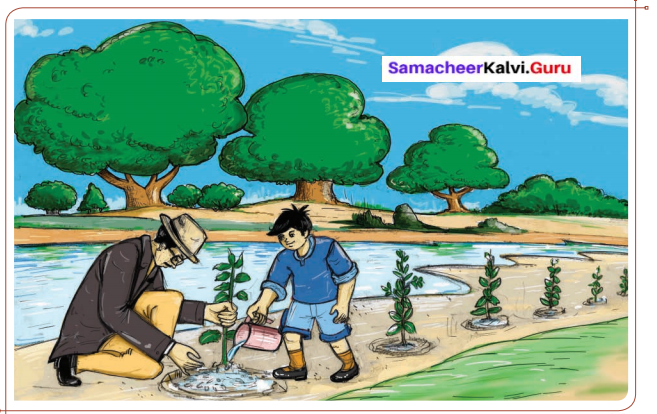
Grandfather, during the rains, would walk into the jungle beyond the river-bed with saplings and cuttings, which he would plant in the forest. The Narrator questioned Grandfather that no one would come there. Grandfather replied that he was planting them for the forest and for the animals and birds for more food and shelter. He also explained that trees are required to keep the desert away, to attract rain, to prevent the banks of rivers from being washed away, for fruits and flowers.
The Narrator helped Grandfather with enthusiasm while Grandfather taught the narrator a George Morris poem. Grandfather said trees would start to walk again like they did earlier until some busybody (a mischief) cast a spell on them.
The narrator and Grandfather saw an island that was dry in summer but flooded during rains. Grandfather saw a small mango tree growing there and decided to plant tamarind, laburnum and coral tree saplings on the island.
Section III
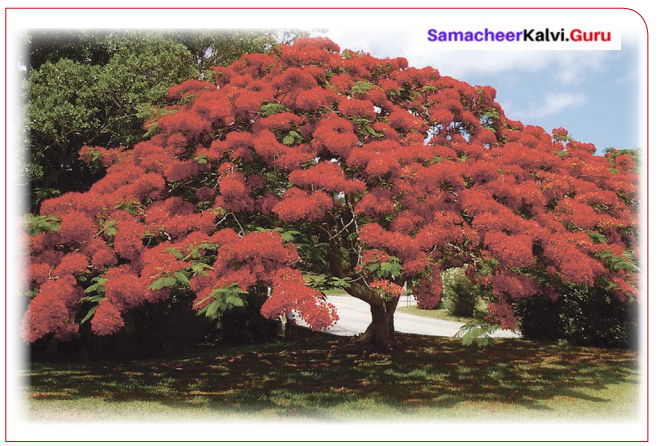
The narrator spent the monsoon season with his Grandparents, where he saw life and greenness brought by the rains. He also saw broad-leaved vines, peepul trees taking root in the ceiling, a mango sprout on the window-sill. During Second World War , the narrator went to live with his father in Delhi. After two or three years he left for England and returned to India after several years. When he returned to Dehradun after many years, he walked towards the river bed. He was surprised to see the spectacular (amazing) view of the island where they had planted coral tree saplings. He could hear squirrels and koel asking him who he was ?. The narrator could see that the trees recognized him and came nearer. He thought of what his Grandfather had said, “Trees are walking again”.
